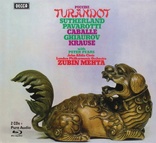
The name: Giacomo Puccini: "Turandot"
Original title: Puccini: Turandot
Release year: 1972
Genre: opera
Conductor: Zubin Mehta
Cast: Joan Sutherland (soprano - Turandot), Luciano Pavarotti (tenor - Calaf), Montserrat Caballé (soprano - Liu), Nicolai Ghiaurov (bass - Timur), Tom Krause (baritone - Ping), Pier Francesco Poli (tenor - Pang ), Piero De Palma (tenor - Pong), Peter Pears (tenor - L'imperatore Altoum), Sabin Markov (baritone - Un mandarino), London Philharmonic Orchestra, John Alldis Choir
Description:
The world's most famous tenor performs the world's most famous tenor aria, Nessun dorma, on this 1972 recording of Giacomo Puccini's Turandot. It was Luciano Pavarotti's signature aria: he performed it at his final concert. Pavarotti was on the BBC's World Cup telecasts. The aria charted again in 2007 after this version was played at his funeral. In addition to Pavarotti, the star-studded recording features Joan Sutherland, Montserrat Caballé, Nicolai Ghiaurov, conductor Zubin Mehta and the London Philharmonic Orchestra.
"... Sutherland gives an intensely revealing and appealing interpretation ... Pavarotti gives a performance equally imaginative, beautiful in the sound, strong on detail, Mehta directs a gloriously rich and dramatic performance, superlatively recorded, still the best-sounding Turandot, while The reading also remains supreme. " --The Penguin Guide
"Turandot is a psychologically complex work fusing appalling sadism with self-sacrificing devotion. The icy Princess of China has agreed to marry any man of royal blood who has posed. If he fails his head will roll. Calaf, the son of the exiled Tartar king Timur, answers all the questions easily and when Turandot hesitates to accept him, magnanimously offers her a riddle in return - 'What is his name?'. Liù, Calaf's faithful slave-girl, is tortured but rather revealing his identity kills herself. Turandot finally capitulates, announcing that his name is Love. Dame Joan Sutherland's view of the title of the role is statuesque, combining regal poise with a more human warmth, while Montserrat Caballé is a touchingly sympathetic Liù, skilfully steering the character away from any hint of the mawkish. Pavarotti's Calaf is a heroic figure in splendid voice and the chorus is handled with great power, baying for blood at one minute, enraptured with Liù's nobility at the next. Mehta conducts with great passion and a natural feel for Puccini's wonderfully tempestuous drama. Well recorded. "--The Gramophone Classical Music Guide
Recorded at Kingsway Hall, London, August 1972.
Issued: United States | Decca
Duration: 1:57:52
 淘宝店铺:http://94hd.taobao.com
淘宝店铺:http://94hd.taobao.com